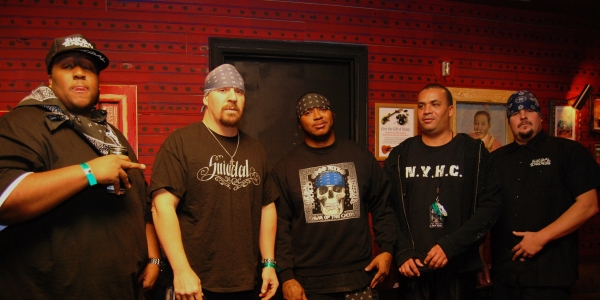Despite a couple of hiatuses, the odd change in artistic direction, battles with censorship authorities and a regular turnover in members, thirty years later and Suicidal Tendencies are still around. It wasn’t all plain sailing in the beginning, however, with Suicidal Tendencies beset by associations with the LA gang scene. In a 1982 article in Flipside magazine, Suicidal Tendencies were voted ‘Worst Band/Biggest Assholes’, a title that did little to ultimately curb the band’s burgeoning popularity. “That did have a negative side, but our attitude wasn’t about a particular scene, it was about the band and the music,” Muir argues.
Suicidal Tendencies started out as another low-rent band in the Los Angeles punk scene, graduating eventually to playing headline shows in rented halls. “We started out playing rent parties, and when the rent parties got big, we started hiring our own halls,” Muir recalls. While it’s easy to assume a level of camaraderie in the LA punk scene, the singer remembers there was plenty of jealousy in the mix. “We’d play shows with other bands, and we’d be getting fans turning up with Suicidal t-shirts and head bands. People would see us, and then they’d leave, and the other bands we were playing with wouldn’t like that,” he says.
The band had already attracted negative attention for its provocative name. In the 21st century, while suicide, depression and mental illness are topics of considerable public sensitivity, Muir explains that, in the early 1980s, ill-informed attitudes toward suicide meant that Suicidal Tendencies were cast in a negative light even before they even opened their mouth. “I’ve gotta say it was way, way worse back then,” Muir nods. “People would be taken from home and sent to a camp to be fixed up if they showed signs of depression and alienation.”
It was Muir’s critical observations of such attitudes that led him to write Suicidal Tendencies’ now classic track, Institutionalised. While the band battled accusations of condoning suicide, Muir says the opposite was true. “In hindsight, what we were saying goes back to definitions, the definition of ‘normal'” he argues. “If you’ve got a cheerleader with a big smile on her face, that’s nice, but the smile isn’t normal.”
To the extent that Suicidal Tendencies bore a message, it was about self-empowerment. “If everything you do doesn’t work, you’ve got to change it,” Muir figures. “You have to go out and make deliberate decisions. You have to take responsibility. Whether it’s a job or a relationship, you should do what makes you happy.”
In the mid-1980s the American music industry found itself under attack from the Parents Music Resource Centre (PMRC), a conservative lobby group led by Tipper Gore, wife of then Senator (and later Vice-President) Al Gore. Frank Zappa famously attacked the PMRC at Congressional hearings in the 1980s; Suicidal Tendencies took up the baton in their confrontational way, with songs such as You Can’t Bring Me Down. 25 years after the PMRC’s campaign and ‘parental advisory’ stickers – a key part of the PMRC platform – are commonplace. Muir, however, rejects any suggestion the PMRC won the battle. “I look at it in a different way,” he says. “In the US we had Al Gore, and when he started running for President, his approval ratings were way, way down because Tipper was a political liability. So he had to distance himself from the PMRC.”
Muir suggests bands would use PMRC interest in a tactical manner, releasing offensive album artwork to garner attention, and then conveniently releasing alternative artwork immediately after the obligatory public outcry. When the PMRC set its sights on Suicidal Tendencies, Muir was ready. “The record label didn’t want to release our album because it had ‘Suicidal’ in the title,” Muir remembers. “We said ‘if you get Tipper Gore to say to kids not to buy the record, then millions of kids are going to want to buy it. And I’ll go out and appear on every talk show, because I can talk the language of middle America and I would rebut everything the PMRC was going to say’. So the label went back to the PMRC and said ‘You’re going to have a war on your hands’. So Tipper Gore and the PMRC retreated and they never mentioned the band’s name,” Muir grins.
Despite once signing with a major label in the 1980s, Muir says Suicidal Tendencies has never felt constrained by commercial expectation. “We put out our first record and we sold a quarter of a million records, which was unheard of for an independent label. “We had two labels approach us and said we needed to change our name, but we said we wouldn’t do that,” Muir says. “We ended up signing to CBS and we had our artistic freedom written into our contract. So we never submitted our records to the label for approval – if they’d said no, we could have walked away.”

